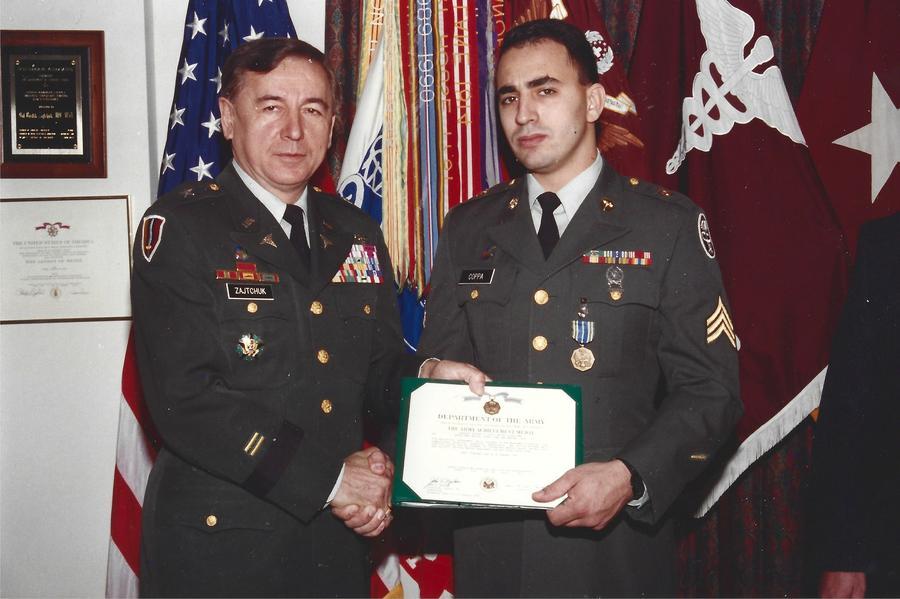When Experience, Passion and Talent Converge — A Military Veteran’s Second Career

If there's anyone who can understand how to best support the needs of our military's healthcare workers in the field, it's Jeff Coppa. He joined the U.S. Army as a combat medic, later becoming a licensed practical nurse. During his 10 years in the service, Jeff deployed to Bosnia and Korea, where he earned the Expert Field Medical Badge, and served under various commands, including the 101st Airborne Division (Air Assault) at Ft. Campbell where he earned the Air Assault Badge.
Jeff worked in a cardiology ward at Ft. Sam Houston as a nurse and managed an emergency room at Camp Casey, Korea. He also served on one of only two Army forward surgery medical teams. While he had planned to stay in the Army for 20 years, Jeff had to medically separate following three knee surgeries due to his Air Assault adventures.
Thankfully, he discovered a way to join two of his interests – healthcare and a lifelong love of technology – in his next career. Throughout his service, the internet went from useful and accessible to necessary for efficient operations.
“I'd been a sci-fi fan and a geek for technology since I was young. I'd always been interested in the latest computers and jumped at the chance to learn more," he says.
While serving on the 101st Airborne, Jeff volunteered to take technical courses to bring his often-deployed team up to speed. “This was at a time when computers were going mainstream, and the internet was quite new. While we were in Bosnia, I spent a lot of time experimenting with new technology."
When he found out he needed to medically separate from the military, Jeff was offered skills training and decided to take IT classes. He earned certifications in Microsoft and Novell.
“I knew the world was going in that direction and that I should get in early," he says. Not only did he find a job quickly, he found one in which he could continue serving the forces from the civilian side while exploring his interest in emerging technologies. Since then, Jeff has spent his entire 25-year civilian career with one company: Leidos.
Combining service and technical skills in his civilian career
Today, Jeff supports the U.S. military's legacy healthcare system as senior technical lead. His responsibilities include scripting and deploying code to simplify complex tasks, authoring and maintaining technical work instructions, training and mentoring, data analytics, managing enterprise processes, and overseeing his group's project website to leverage increased efficiencies.
Over the course of his long career with Leidos, he has held many roles – including network specialist, site manager, operations support, and bid and proposal work – across various locations. Starting in San Antonio, Texas, Jeff later moved to Huntsville, Ala., where he rebuilt the Fox Army Health Center network. He then moved to Guantanamo Bay Naval Hospital, where he deployed new wireless technologies and wired and connected a field hospital before relocating again to Montgomery, Ala.
“I know the standard advice to people looking for upward mobility is to change companies every few years, but I never found the need to do that here," Jeff says, noting that he has remained at Leidos for 25 years because he's always been treated well and had room to grow.
He attributes his successful and extensive career at Leidos to his ambition, relationships with mentors, and drive to learn.
“I kept in touch with people who could point me in the right direction," Jeff says. “And I always keep learning, even hitting the books to learn the basics of DCL programming."
Jeff's advice for military members: learn how to translate your skillset
“The work ethic I learned as a soldier and the leadership skills I honed as a noncommissioned officer have served me well," Jeff says. “The experience and the discipline people develop in the military are great assets in the civilian world, but learning to apply them can take some time."
Having hired and worked with many military veterans over his career, Jeff strives to help them maintain their valuable “mission first" mentality while teaching them lessons he had to learn the hard way.
“After the military, I realized that I needed to tone down my leadership style and adopt a gentler way of communicating," Jeff explains.
He advises transitioning service members to connect with mentors while also taking responsibility for growing their skills and continually learning. He also says they shouldn't sell themselves short.
“Planning and organizing, adapting to changing situations, working long hours, and teamwork are a staple in the Army—and those same skills apply equally well in the civilian world," he says, adding that veterans often focus too much on their military job titles, which civilians don't fully understand, and forget to include valuable ancillary duties and skills.
“Imagine an ex-noncommissioned officer in the infantry. While there isn't much demand for digging foxholes in civilian life, that person led teams to accomplish missions under what may have looked like impossible situations. They also managed supply chain issues, planned and organized travel, provided daily personnel management, and so much more. They can point that out in their resumés and interviews," he says.
“You don't need a degree in management to be a manager."
When preparing to look for civilian work, veterans should consider the skills they honed while in the service and be ready to explain how those apply to the civilian workforce. Finally, look for a company that understands and values what you bring as a military veteran.
“I've been lucky enough to work in so many different roles that I've never had time to become bored," Jeff emphasizes, noting that Leidos invests in its people and their ability to connect with one another across organizational teams and locations.
"I love the values at Leidos," Jeff says, noting that the concept of diversity and inclusion was non-existent in his small-town upbringing in West Virginia. His time in the Army changed that. "My experience was that there was just one color – green."
This worldview has stuck with him, and the culture at Leidos further strengthens it.
“While I loved being part of the small, elite team in the 101st, I've been blessed in so many ways at Leidos. I've made friends that have lasted nearly my entire career and been mentored by some exceptional leaders. I would not be where I am today without their leadership and guidance. I'm most proud of being able to call these people my friends."
JOIN OUR MISSION
Leidos is committed to hiring and supporting military veterans and spouses.

